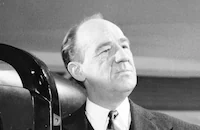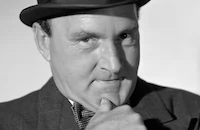Sink the Bismarck!
Brief Synopsis
Cast & Crew
Lewis Gilbert
Kenneth More
Dana Wynter
Carl Mohner
Laurence Naismith
Geoffrey Keen
Film Details
Technical Specs

Synopsis
In May of 1941, noted newscaster Edward R. Murrow broadcasts a paean to the spirit of the British people as they are valiantly trying to stop the spread of Nazism throughout Europe. The course of the war, and thus the future of the world, depends on the Battle of the North Atlantic, which is being directed from the Admiralty Building in London, the central nervous system of the British Navy. When Capt. Jonathan Shepard, the recently appointed director of the operation, assumes command, he insists on strict adherence to regulations, disgruntling many of the old timers. After word comes that the Bismarck , the fearsome, most powerful German battleship afloat, may have been spotted off the coast of Norway, Shepard and the First Sea Lord scramble to pinpoint the behemoth's location before it can break out into the Atlantic. Meanwhile, as the Bismarck pulls up anchor from its hiding place in the Nazi-occupied port of Bergen, Norway to begin its voyage into the Atlantic, the German Fleet Commander sings the ship's praises as the symbol of the glory of the Third Reich. In a desperate race to stop the Bismarck , Shepard dispatches the battleship Prince of Wales , even though its crew is green and civilians who have been refitting the vessel at the shipyard are still aboard. When the Bismarck and its escort is spotted in the Denmark Straits, Shepard instructs the Prince of Wales to attack at dawn. In London, meanwhile, the Aide to the Sea Lord, an old friend of Shepard's, counsuls Lt. Anna Davis, the WREN officer serving as Shepard's aide, to have compassion for her superior, who lost his ship the previous year and whose son is presently serving at sea. As dawn nears, tension mounts aboard the Prince of Wales , which is joined by the warship Hood , the pride of the British navy. As the ships clash, the Bismarck outguns the Hood , sending it plummeting in flames to the bottom of the sea. Badly damaged in the attack, the Prince of Wales turns back, leaving the Bismarck unimpaired to roam the high seas. Realizing that the Bismarck 's' fuel line has been hit, the ship's captain, Lindemann, recommends putting in for repairs but is overruled by the admiral, who, intent on seeking greater victories, pushes forward. When word of the Hood 's demise reaches England, Winston Churchill orders that all risks must be overridden in the quest to sink the Bismarck . In desperation, Shepard strips the western Mediterranean of its ships, thus sending his own son, who is serving there, into battle against the deadly Bismarck . After the Bismarck 's escort departs, British flyers spot the battleship and drop a series of bombs, barely hitting the ship. To throw off the trailing British cruisers, the admiral orders the Bismarck to assume a zigzag pattern, thus losing their pursuers. Sensing that the admiral, in his quest to prove German superiority, will head for France rather than return home to Germany, Shepard deduces that the warship is headed for Brest, a Nazi-occupied city, and sends the aircraft carrier on which his son is stationed to the area. When word comes that his son's plane is missing, Shepard painfully recalls the day he returned home from sea to find his house shelled and learn that his wife was killed. Shepard then grimly states the incident made him determined never to become attached to anyone again. Anna, who lost her fiancé in war, commiserates and then accepts Shepard's offer to become his assistant, even though it means forgoing a lucrative promotion. Once the Bismarck is again sighted, Shepard dispatches the British warship King George to attack and then orders an air strike to prevent the German ship from reaching friendly waters until the King George can reach it. Her rudder damaged by the aerial bombs, the Bismarck is crippled. As the German admiral delivers an inspirational speech to his crew, the King George , accompanied by its cruiser, fires a deadly salvo at the Bismarck . Meanwhile, at British headquarters, Shepard sobs in relief at word that his son has been rescued at sea. Raked by torpedoes and gunfire, the Bismarck is doomed, but the delusional admiral promises the crew that the führer will save them, then dies holding a congratulatory telegram from Hitler. Amid the chaos onboard, Capt. Lindemann gives the order to abandon ship, and finally, the Bismarck sinks in flames. When news of the victory reaches London, Shepard invites Anna to a celebratory dinner, and they emerge from endless days shut away in their cramped offices into the daylight.

Director
Lewis Gilbert
Cast

Kenneth More

Dana Wynter

Carl Mohner

Laurence Naismith
Geoffrey Keen
Karel Stepanek

Michael Hordern

Maurice Denham

Michael Goodliffe

Esmond Knight
Jack Watling
Jack Gwillam
Mark Dignam
Ernest Clark
John Horsley
Peter Burton
Sydney Tafler
John Stuart
Walter Hudd
Sean Barrett
Edward R. Murrow
Crew
Shirley Barnes
John Brabourne
Jack Causey
Christopher Challis
Austin Dempster
Ivy Emmerton
Richard Goodwin
Peter Hunt
Edward Joseph
Skeets Kelly
Red Law
Arthur Lawson
Werner Lust
Bill Lydecker
Muir Mathieson
Dudley Messenger
Edmund H. North
Clifton Parker
W. T. Partleton
Lt. Cdr. Peter Peake R.n. (rtd)
Nora Roberts
Win Ryder
Arthur Taksen
Bill Warrington
Jack Welch

Film Details
Technical Specs

Quotes
Take a message: "Request pleasure of the company of Second Officer Anne Davis at dinner."- Captain Jonathan Shepard
Trivia
Prior to the release of the movie, a song of the same title sung by Johnny Horton was released in the United States to promote the film. This song never appears in the actual film.
The producers knew that the use of miniatures and explosions would have to look very realistic to be successful. They imported one of the legendary Lydecker brothers, Howard, from the United States.
Notes
The opening and ending onscreen cast credits differ slightly in order. Noted newscaster Edward R. Murrow, who was based in London during World War II, appears as himself in the film. As described in the film, the Bismarck was a powerful German warship that escaped a British naval blockade to break out into the Baltic Sea in May 1941, thus threatening the entire British convoy system. After a massive effort, the British were finally able to sink the Bismarck on May 27, 1941.
The film opens with actual newsreel footage of Adolf Hitler launching the Bismarck on February 14, 1939. According to a February 1958 Hollywood Reporter news item, C. S. Forester, the author of the book on which the film was based and a noted navy chronicler, was initially assigned to write the script. The extent of his contribution to the released film has not been determined, however. Studio publicity materials contained in the film's production file at the AMPAS Library reveal that the Royal Navy loaned an aircraft carrier to Twentieth Century-Fox for the making of the picture. The publicity materials add that Werner Lust, who worked as a technical advisor on the German sequences, was an actual Bismarck survivor. The film's producer, John Brabourne, was the son-in-law of Lord Louis Mountbatten, Britain's First Lord of the Admiralty.
On June 8, 1989, Dr. Robert Ballard, who had found the R.M.S. Titanic in 1985, discovered the wreckage of the Bismarck approximately 600 miles west of Brest, Belorussia. A television special, James Cameron's Expedition: Bismarck, broadcast on the Discovery Channel on December 8 2002, used modern technology to explore the sunken remains of the Bismarck. An unsubstantiated conclusion of that exploration was that the Bismarck was scuttled by its crew in order to avoid having the vessel fall into enemy hands.

Miscellaneous Notes
Released in United States Winter February 24, 1960
Released in USA on video.
Scope
Released in United States Winter February 24, 1960











